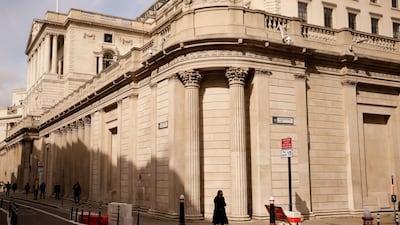The Bank of England held interest rates at record lows and kept the size of its stimulus programme unchanged on Thursday as the lender said the UK economy is set to enjoy its strongest peacetime growth as Covid-19 restrictions ease.
The economy is expected to expand 7.25 per cent this year, the central bank said, returning to its pre-pandemic size by the fourth quarter of this year, with government support for workers and businesses helping to limit job losses.
The positive outlook came as the BoE kept the size of its stimulus programme unchanged at £895 billion ($1.24 trillion) while the monetary policy committee also voted unanimously to hold the benchmark lending rate at a record low of 0.1 per cent. The lender cut interest rates to current levels in March last year.
Andrew Bailey, governor of the BoE, said the economy's bounceback is not to be "underestimated" and should be seen "as good news".
“GDP is expected to recover strongly to pre-Covid levels over the remainder of this year in the absence of most restrictions on domestic economic activity,” the BoE said in its Monetary Policy Report.
However, the central bank said it would slow its bond-buying to £3.4bn a week between May and August, down from the current pace of £4.4bn a week.
"The expected completion point of the purchase programme remained unchanged. This operational decision should not be interpreted as a change in the stance of monetary policy," the BoE said.
Susannah Streeter, senior investment and markets analyst at Hargreaves Lansdown, said while the UK economy is "not out of the woods yet", the path is becoming clearer.
"After administering a huge dose of medicine to help its patient through the pandemic, the BoE signalled it’s willing to ease the quantitative easing drug, by slowing the rate of government bond purchases, although they will still hit £875bn," Ms Streeter said.
Britain suffered its worst economic hit in more than 300 years in 2020, when gross domestic product plummeted by almost 10 per cent after the country was hammered by the fallout from the Covid-19 crisis which forced the closure of non-essential shops and businesses.
The BoE’s expectation of a 7.25 per cent rebound this year comes as the economy gradually reopens following the third national lockdown in England with the full removal of restrictions expected on June 21. The rebound is much faster than the 5 per cent initially forecast by the central bank three months ago.
However, the lender lowered its projection for growth in 2022 to 5.75 per cent from its previous estimate of 7.25 per cent.
The Bank of England said the rebound will be driven by the success of the UK’s vaccination programme as well as the extension of the furlough scheme by Chancellor of the Exchequer Rishi Sunak in his March budget.
Unemployment is set to peak at 5.5 per cent, the BoE said, much lower than its previous forecast of 7.75 per cent. The jobless rate dipped to 4.9 per cent in the three months ending in February.
The BoE’s decision to slow the pace of its emergency bond-buying programme signals that the lender is on course to end crisis support when the strong rebound takes hold across the economy.
The BoE’s downward gear shift comes as other global central banks consider deescalating crisis stimulus measures, with major economies examining how long emergency support is required, particularly once vaccination programmes allow pandemic restrictions to ease.
Norway’s central bank said earlier on Thursday that it is on track to start tightening rates later this year, while US Treasury Secretary Janet Yellen downplayed comments made earlier this week that seemed to suggest interest rate rises might be needed.
More on the Bank of England
UK mortgage lending surges by most on record after stamp duty extension


